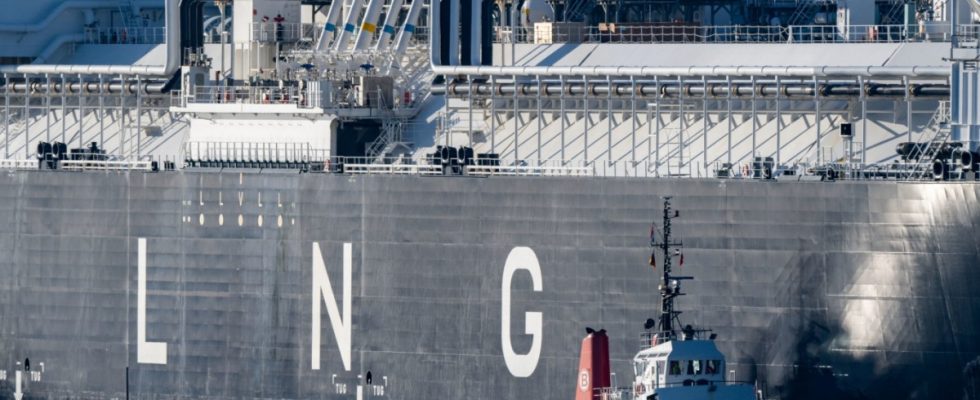Deutsche Regas knows what a large train station looks like. It was just over a year ago that the company put its liquefied natural gas terminal in Lubmin, not far from Greifswald, into operation. Not only Mecklenburg-Western Pomerania’s Prime Minister Manuela Schwesig (SPD) rushed over, but also Federal Chancellor Olaf Scholz. Together they turned a large wheel that opened the pipe’s valve. As a precaution, there were arrows on the wheel so that it would turn in the right direction.
But how different things are this weekend in Sassnitz on Rügen: Deutsche Regas is putting a terminal into operation again in the port of Mukran. It will soon replace the one in Lubmin, where the port is proving to be unfavorable. This time the construction work was even more complex; even a 50-kilometer-long pipeline through the Baltic Sea had to be laid in a hurry. But this time no one is turning big wheels. Quietly moved in on Saturday morning Energo’s power their berth; the day before, the state environmental authority had approved the early start of test operations.
A controversial ship at berth 12
The terminal ship at berth 12 is intended to turn liquefied natural gas back into gaseous form; the molecules will flow via the pipe through the Baltic Sea to the mainland and the German gas network. “Deutsche Regas has delivered again,” says Stephan Knabe, the company’s chairman of the supervisory board. Feed-in will begin this winter. And it ends in four weeks.
The absence of any celebrities may also be related to the bitter resistance against the terminal. Citizens on Rügen have been fighting against the terminal for months, especially in the neighboring community of Binz. Because the large LNG tankers that bring the natural gas to Mukran will have to pass the long beach of the seaside resort or anchor within sight. Because the ships have to cool the liquefied gas, they are not exactly quiet. The opponents tried to thwart the terminal with demonstrations, citizens’ petitions and lawsuits. Environmental associations complained until recently against the construction of the “Baltic Sea connection line” from Mukran to Lubmin, but without success.
The mayor of Binz wants to go to court
The federal government, on the other hand, expects the terminal to provide more security for gas supplies. That is why it has included the project in its LNG acceleration law. Unlike the other floating terminals, which are all located on the North Sea, this one feeds directly into the East German gas network. Theoretically, gas can also be supplied from here to countries such as the Czech Republic or Hungary, which currently receive Russian gas. The commissioning is “a real success,” says Carsten Schneider (SPD), the Federal Government’s Eastern Commissioner. “The fact that the terminal could be built and the necessary lines laid within just a few months is proof of the new pace in Germany.” That is exemplary.
But the opponents don’t want to give up. The mayor of Binz, Karsten Schneider, a namesake of the eastern commissioner, announced a lawsuit against the commissioning at the Federal Administrative Court at the weekend. “We are very optimistic that the justice system will put an end to this nonsense,” he says. “Mass is far from being said.” Deutsche Umwelthilfe, one of the plaintiffs, is not giving up either. “We will continue to exhaust all legal means to stop operations,” says Constantin Zerger, energy expert at the environmental association. It is shameful that business interests are being enforced against the interests of people and the environment. “There is no such thing as a gas shortage,” says Zerger.
This could also become a problem for the terminal. The route to the Baltic Sea is longer and more expensive for tankers than to terminals on the North Sea. The terminal in Lubmin, which was once so ceremoniously inaugurated, has only been at moderate capacity for months. Meanwhile, local gas storage facilities are still 70 percent full at the end of winter. It is quite possible that the future of the terminal will not be decided in court – but on the market.

